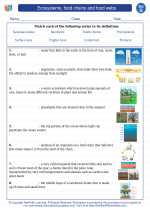Environmental Conditions
Environmental conditions refer to the various physical, chemical, and biological factors that influence the growth, development, and survival of organisms within a particular ecosystem. These conditions can include temperature, humidity, light, pH, air and water quality, and the presence of other living organisms.
Factors Affecting Environmental Conditions
- Temperature: The degree of hotness or coldness of a body or environment. Different organisms have specific temperature ranges within which they can thrive.
- Humidity: The amount of water vapor present in the air. It affects the ability of organisms to regulate their internal water balance.
- Light: The presence and intensity of light in an environment. It is crucial for photosynthesis in plants and can also affect the behavior and physiology of animals.
- pH: The measure of acidity or alkalinity of a solution. Organisms have specific pH ranges in which they can survive and function properly.
- Air and Water Quality: The purity and composition of air and water can significantly impact the health of organisms. Pollution and contaminants can have detrimental effects.
Adaptations to Environmental Conditions
Organisms can exhibit various adaptations to cope with and thrive in specific environmental conditions. These adaptations can be structural, behavioral, or physiological.
- Structural Adaptations: Physical features that enhance an organism's survival in a particular environment, such as the thick fur of Arctic animals.
- Behavioral Adaptations: Actions and patterns of behavior that help an organism survive, such as migration in response to changing seasons.
- Physiological Adaptations: Internal mechanisms that allow an organism to function in specific environmental conditions, such as the ability of desert plants to minimize water loss.
Impact of Environmental Conditions
Changes in environmental conditions, whether natural or human-induced, can have profound impacts on ecosystems and the organisms within them. These changes can lead to shifts in species distribution, alterations in food webs, and even extinctions.
Study Guide
Here are some key points to focus on when studying environmental conditions:
- Identify and understand the various environmental factors that can influence organisms.
- Learn about specific examples of organisms and their adaptations to different environmental conditions.
- Explore the impact of human activities on environmental conditions and the resulting effects on ecosystems.
- Consider the interconnectedness of environmental conditions and the delicate balance required for healthy ecosystems.
Understanding environmental conditions is essential for comprehending the complexities of ecosystems and the interactions between organisms and their environment.
.◂Science Worksheets and Study Guides Seventh Grade. Ecosystems, food chains and food webs

 Activity Lesson
Activity Lesson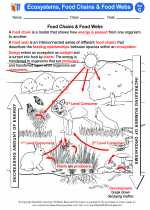
 Worksheet/Answer key
Worksheet/Answer key
 Worksheet/Answer key
Worksheet/Answer key
 Worksheet/Answer key
Worksheet/Answer key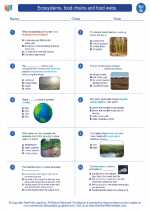
 Vocabulary/Answer key
Vocabulary/Answer key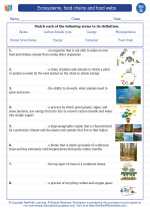
 Vocabulary/Answer key
Vocabulary/Answer key
 Vocabulary/Answer key
Vocabulary/Answer key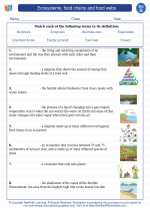
 Vocabulary/Answer key
Vocabulary/Answer key
 Vocabulary/Answer key
Vocabulary/Answer key